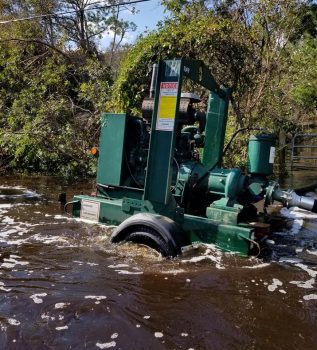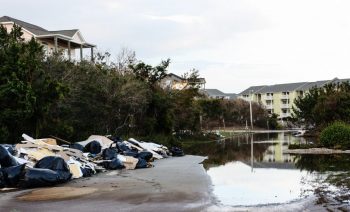OCEAN – Officials with the North Carolina Coastal Federation and the state of North Carolina advise residents and tourists that it’s not yet safe to swim and wade in coastal waters.

Water pumped out of a flooded Emerald Isle street. Photo: Town of Emerald Isle Facebook
Massive amounts of polluted runoff are still flowing into coastal waterways all along areas of our coast impacted by heavy rains from Hurricane Florence. Groundwater levels are at record highs as a result of up to 30 inches of rainfall that occurred. This runoff has high levels of bacteria and other pollutants that come from natural and human sources.
“Excessive rains and flooding can cause high levels of bacteria in the water that can make people sick,” J.D. Potts, manager of the North Carolina Recreational Water Quality Program, said in a press release on Sept. 11.
Coastal swimming waters contaminated with polluted runoff carry bacteria, parasites and viruses that can cause many types of illnesses from minor to severe infections. These illnesses include bacterial infections, earaches, hepatitis, skin rashes and respiratory issues. Stormwater runoff is a known cause for these illnesses.
Contaminated runoff is draining into coastal estuaries and the ocean through ditches, yards, parking lots and hundreds of other pathways. Coastal Review Online reports that beach towns like Pine Knoll Shores and Emerald Isle are advising residents to stay out of standing water due to contamination and possible infections that can arise.
On Sept. 24, the Recreational Water Quality Program issued another press release informing the public of the continued water advisories. Their website also has a live map noting sites for water quality advisories. However, the federation staff has observed people swimming in the ocean and estuaries. The federation is warning them that coastal waters are not safe for swimming and wading.
“The public continues to swim in the ocean and sounds despite these advisories. We feel it’s vital to let people know that the state has not yet tested any waters to determine if they are safe for human contact,” said Todd Miller, executive director of the federation. The federation strongly advises the public to stay out of the water until it can be tested by the state and deemed safe for recreational uses.

Standing water in Emerald Isle. Photo: Logan Prochaska
State water quality testing labs that are used to make sure swimming and shellfishing waters are safe were damaged by the storm and aren’t operating. For this reason, no samples from swimming and shellfishing waters have been analyzed by the state since the hurricane hit.
All shellfishing waters in areas impacted by the hurricane are also closed and will not be reopened for harvest until the state tests the waters and finds that they are safe. The federation says that a similar protocol for recreational swimming waters should be followed.
“We need to be loud and clear that swimming in coastal waters is currently a threat to public health, safety and welfare,” stated Miller.
Updated on Sept. 27, 2018:
The federation collected water samples at Wrightsville Beach earlier this week in the wake of massive stormwater runoff from Hurricane Florence.
Results show elevated levels of bacteria in ocean and intracoastal waters in and around Wrightsville Beach.
We recommend the public avoid contact with coastal waters identified on the Recreational Water Quality Program’s website map with precautionary advisories until the state conducts testing to determine waters are safe for recreational use.
See precautionary advisory from the state here.
Contact Kerri Allen, coastal advocate, at (910) 619-8469 or Tracy Skrabal, coastal scientist, at (910) 231-6601 with any questions.
Updated on Sept. 28, 2018:
Oceanside swimming advisories have been lifted in Carteret, Pender and Onslow Counties. Monitoring is still being conducted in Brunswick, New Hanover and Hyde Counties.
Continue checking site map for new information.
Press release regarding these locations can be found here.
Updated on Oct. 1, 2018:
Oceanside swimming advisories have been lifted in New Hanover County and Ocracoke Island.
Continue checking site map for new information.
Updated on Oct. 10, 2018:
The federation is no longer actively monitoring post-storm water quality.
Please contact Erin Bryan-Millush or J.D. Potts with the Department of Water Quality at 252-726-6827 exts. 8153 (Bryan-Millush) and 8154 (Potts).
